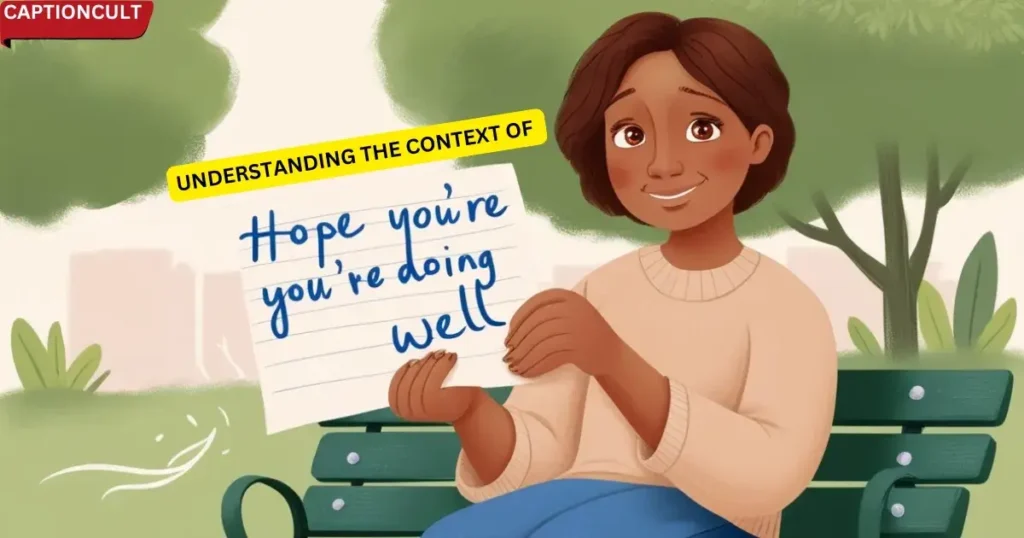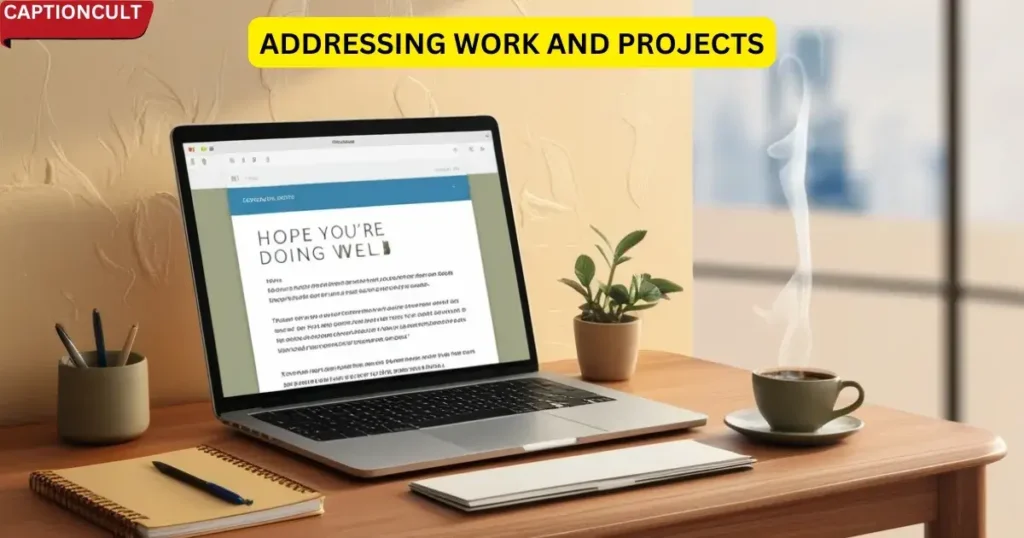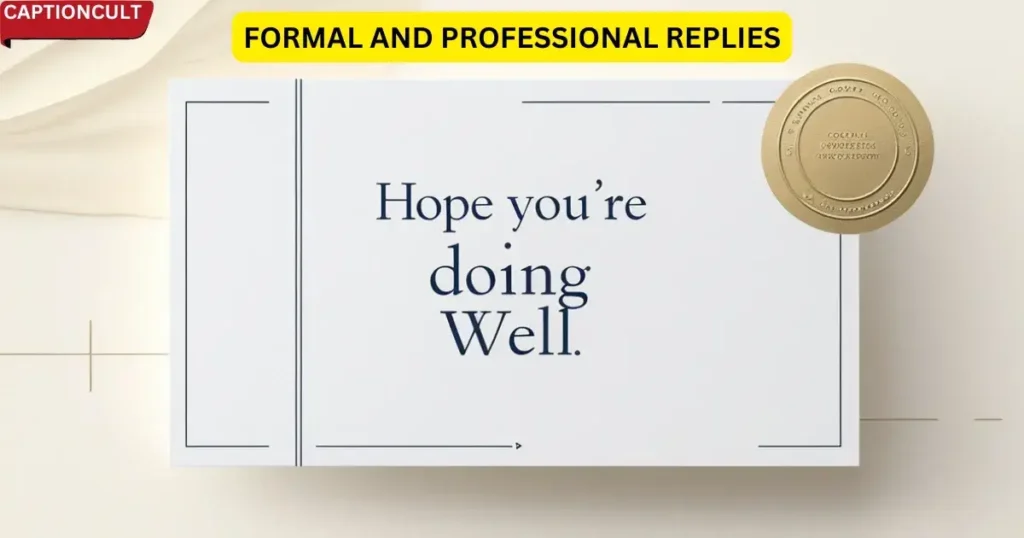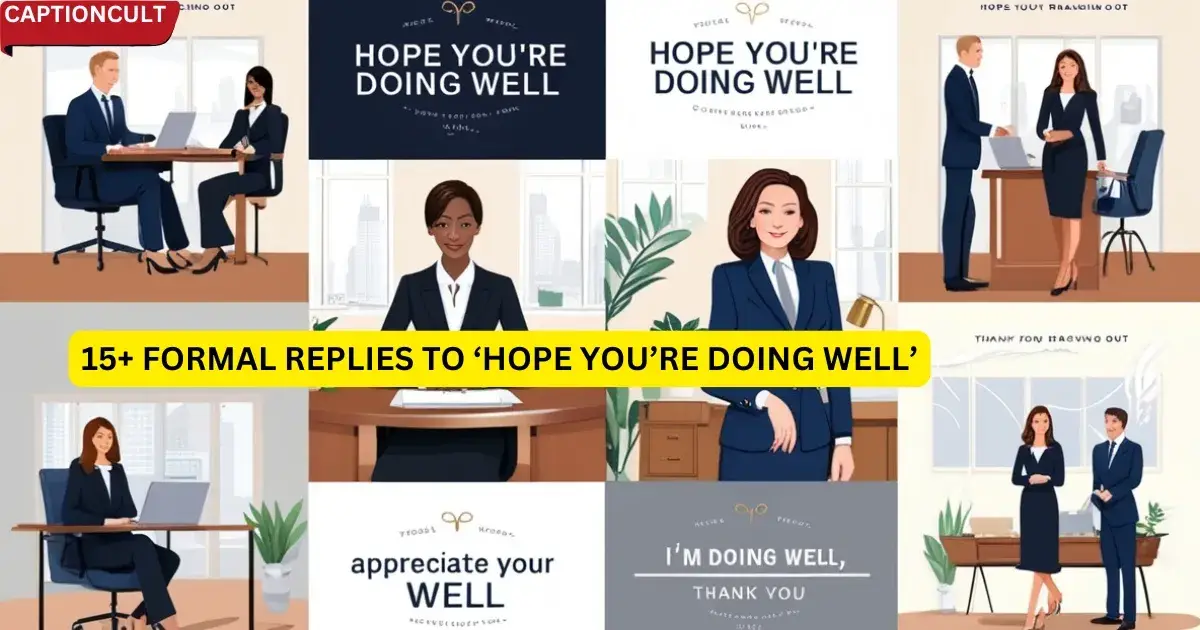Responding to “Hope you are doing well reply” might seem simple, but crafting the right response can significantly impact your professional and personal relationships. A well-chosen hope you are doing well reply demonstrates respect, consideration, and professionalism, fostering positive interactions. Conversely, an ill-considered response can leave a negative impression.
This article explores various scenarios and provides 25+ refined hope you are doing well reply options to ensure you always make a positive impact. We’ll delve into the nuances of formal reply to hope you are doing well, addressing everything from maintaining a professional tone in business communication to expressing genuine gratitude in personal contexts.
Understanding the Context of “Hope You’re Doing Well”

The seemingly simple phrase “Hope you are doing well reply” serves multiple purposes. It can be a casual greeting, a genuine expression of concern, or a professional formality. Understanding the context is crucial for crafting an appropriate hope you are doing well reply. A brief email exchange requires a different approach than a longer conversation. Consider the relationship with the sender: is it a colleague, a client, a friend, or a family member? This context significantly influences the appropriate hope you are doing well reply.
25+ Formal Replies to “Hope You’re Doing Well”
Here are 25+ options for a hope you are doing well reply, categorized for clarity and to help you select the most appropriate response for each situation. Each reply considers tone management, contextual relevance, and response politeness, ensuring a positive and professional impression.
General Positive Responses
- “Thank you for your kind words. I’m currently in good health and spirits.” (Simple, direct, and positive. Suitable for most situations.) This hope you are doing well reply is a classic and always effective.
- “Yes! Everything is fine on my end. I hope you are doing well reply too.” (Enthusiastic and reciprocal. Ideal for informal settings or close relationships.)
- “Thanks for your concern, I’m doing well and keeping busy.” (Acknowledges the concern while subtly indicating engagement.)
- “I’m glad you reached out. I’m doing fine and staying engaged with my tasks.” (Warm and professional. Suitable for professional communication.)
- “I appreciate you checking in. I’m doing very well, thank you.” (Formal and polite. Excellent for professional emails or formal communications.)
Addressing Work and Projects

- “I’m currently managing my projects well and appreciate your concern.” (Professional and focused on work. Suitable for work-related communications.)
- “Things are going smoothly, and I’m doing well. Thanks for checking in.” (Concise and positive. Appropriate for updates within a team.)
- “I’m making good progress with my current responsibilities and appreciate your interest.” (More detailed work update, showing progress.)
- “Work is keeping me engaged, and I’m doing fine. Thanks a lot!” (Slightly more informal, but still professional.) This hope you are doing well reply works well in less formal settings.
- “Thanks! I’m managing well and looking forward to upcoming challenges.” (Positive and proactive. Shows confidence and enthusiasm.)
Expressing Gratitude and Reciprocity
- “I appreciate your message! Wishing you the best as well.” (Expresses gratitude and extends good wishes.) This reply for hope you are doing well exemplifies politeness.
- “Thank you! Sending positive vibes your way.” (Warm and positive, suitable for close professional relationships or personal communications.)
- “I’m doing well, thanks! Hope you are doing well reply too.” (Simple, polite, and reciprocal.)
- “Thanks for checking in! I hope you are doing well reply and having a wonderful day.” (Friendly and thoughtful.)
- “I appreciate you reaching out! May your day be as lovely as you are.” (Warm and complimentary.) This reply for hope you are doing well is perfect for close relationships.
- “Thank you! I hope you are doing well reply too.” (Simple, direct, and polite.)
More Detailed and Engaging Replies
- “I’m doing well, thank you for asking. I’ve been busy with [briefly mention a project or activity], but it’s been rewarding. How are you?” (Engaging and opens the conversation.) This reply for hope you are doing well and encourages a reciprocal response.
- “Things are progressing well, thank you. I’ve recently completed [achievement] and am excited to work on [next project]. How is everything with you?” (More detailed and professional update.)
- “Thank you for your well wishes. I’m enjoying a productive period, focusing on [mention area of focus]. How are your projects progressing?” (Professional and engaging.)
- “I’m doing splendidly, thank you. I’ve been collaborating on [project/task] with [mention names if appropriate] and the results are promising. How are things on your end?” (Detailed and collaborative.)
Formal and Professional Replies

- “Thank you for your email. I am doing well and managing my current responsibilities effectively. Please let me know if there is anything I can assist you with.” (Professional and helpful.)
- “Thank you for your inquiry. My current status is positive and I am on track to meet deadlines. Is there anything I can provide an update on?” (Proactive and professional.)
- “I appreciate your message. Everything is proceeding smoothly and I’m focused on [mention key tasks/goals]. I hope the same holds true for you.” (Positive and focused on goals.)
- “Thank you for your concern. I am successfully navigating my current workload and am optimistic about the future.” (Positive and confident.) This hope you are well reply demonstrates both positivity and professionalism.
- “Thank you for reaching out. I’m doing well and managing my tasks effectively. I am looking forward to our upcoming collaborations.” (Positive and collaborative.)
Additional Tips for Responding to “Hope You’re Doing Well”
- Be genuine: Your response should reflect your actual feelings. Avoid overly enthusiastic or overly negative responses.
- Keep it concise: Unless the context calls for a longer response, keep it brief and to the point. A short, polite hope you are doing well reply is usually sufficient.
- Reciprocity: Always reciprocate the inquiry by asking, “How are you?” or “I hope you’re doing well too.” This demonstrates politeness and engagement.
- Consider the medium: Your hope you are doing well reply should be appropriate for the communication channel (email, text message, in-person conversation).
- Professionalism: In professional settings, maintain a formal and respectful tone. Avoid slang or overly casual language.
FAQ
What to reply to “I hope you are doing well”?
Express appreciation for their thoughtfulness and briefly share your current well-being. Then, reciprocate the sentiment by asking how they are doing.
Is it correct to say “hope you are doing well”?
Yes, it’s grammatically correct and a common, polite way to inquire about someone’s well-being.
What is the best way to reply?
The ideal reply depends on context; aim for a polite, concise response reflecting your situation and relationship with the sender.
How to respond to “hope you get well”?
Express gratitude for their concern and offer a brief update on your health.
How to reply “Hope all is well with you”?
Acknowledge their well wishes and briefly describe your circumstances, then politely inquire about their well-being.
Conclusion
By understanding the context and employing the appropriate hope you are doing well reply, you can enhance your professional and personal communication, fostering stronger relationships and leaving a positive impression. Remember to choose your hope you are doing well reply wisely and tailor it to each situation.
This guide provides you with the tools to confidently and effectively respond to this common greeting. Remember to always prioritize politeness, genuineness, and contextual awareness when crafting your hope you are doing well reply.

This is a passionate author whose work explores the power of language and storytelling. With a keen eye for detail and a commitment to excellence, Julian believes that every word has the potential to create meaning and beauty. “Where Words Find Perfection” is a reflection of his dedication to crafting narratives that resonate deeply with readers.

